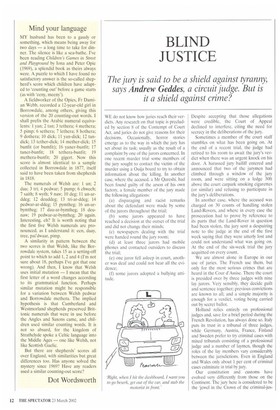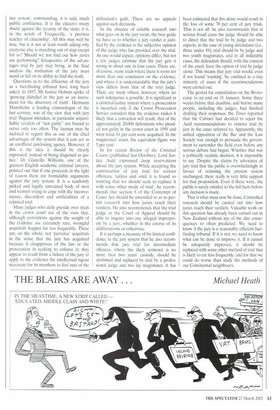BLIND JUSTICE
The jury is said to be a shield against tyranny,
says Andrew Geddes, a circuit judge. But is
it a shield against crime?
WE do not know how juries reach their verdicts. Any research on that topic is precluded by section 8 of the Contempt of Court Act, and juries do not give reasons for their decisions. Occasionally, horror stories emerge as to the way in which the jury has set about its task; usually as the result of a complaint by one of the jurors concerned. In one recent murder trial some members of the jury sought to contact the victim of the murder using a Ouija board to try to obtain information about the killing. In another case, where the accused, a Mr Qureshi, had been found guilty of the arson of his own factory, a female member of the jury made the following allegations:
(a) disparaging and racist remarks about the defendant were made by some of the jurors throughout the trial; (b) some jurors appeared to have reached a decision at the outset of the trial and did not change their minds; (c) newspapers dealing with the trial were handed round the jury room; (d) at least three jurors had mobile phones and contacted outsiders to discuss the trial; (e) one juror fell asleep in court, another was deaf and could not hear all the evidence; (f) some jurors adopted a bullying attitude.
Despite accepting that those allegations were credible, the Court of Appeal declined to interfere, citing the need for secrecy in the deliberations of the jury.
Sometimes a member of the court staff stumbles on what has been going on. At the end of a recent trial, the judge had retired to his room to await the jury's verdict when there was an urgent knock on his door. A harassed jury bailiff entered and announced that two of the jurymen had climbed through a window of the jury room, and were sitting on a ledge 30ft above the court carpark smoking cigarettes (or similar) and refusing to participate in the jury's deliberations.
In another case, where the accused was charged on 30 counts of handling stolen Land-Rovers, and where in every case the prosecution had to prove by reference to its parts that the Land-Rover in question had been stolen, the jury sent a despairing note to the judge at the end of the first week saying that they were utterly lost and could not understand what was going on. At the end of the six-week trial the jury acquitted on every count.
We are almost alone in Europe in our use of juries. The French use them, but only for the most serious crimes that are heard in the Cour d'Assise. There the court is presided over by three judges with nine lay jurors. Very sensibly, they decide guilt and sentence together; previous convictions are known to all; and a simple majority is enough for a verdict, voting being carried out by secret ballot.
Holland relies entirely on professional judges and, save for a brief period during the French Revolution, has always done so. Italy puts its trust in a tribunal of three judges, while Germany. Austria, France, Finland and Sweden prefer to try criminal cases with mixed tribunals consisting of a professional judge and a number of laymen, though the roles of the lay members vary considerably between the jurisdictions. Even in England and Wales only about 1 per cent of criminal cases culminate in trial by jury.
Our constitution and customs have evolved very differently from those on the Continent. The jury here is considered to be the 'jewel in the Crown of the criminal-jus tice system', commanding, it is said, much public confidence. It is the citizen's trusty shield against the tyranny of the state; it is, in the words of Tocqueville, 'a peerless teacher of citizenship'. All this may well be true, but is it not at least worth asking why everyone else is marching out of step except for us? Should we not find out how juries are performing? Irrespective of the advantages trial by jury may bring, in the final analysis the institution of the jurymust stand or fall on its ability to find the truth.
Questions as to the efficiency of the jury as a fact-finding tribunal have long been asked. In 1897, Mr Justice Holmes spoke of 'growing disbelief in the jury as an instrument for the discovery of truth'. Hermann Mannheim, a leading criminologist of the last century, was of the view that with jury trial 'flagrant mistakes, in particular unjustifiable verdicts of "not guilty" are bound to occur only too often. The layman may be inclined to regard this as one of the chief advantages of the system that it can act as an unofficial pardoning agency. However, if this is the idea it should be clearly expressed, instead of being disguised as justice.' Dr Glanville Williams, one of the greatest English academic criminal lawyers, pointed out that if one proceeds in the light of reason there are formidable arguments against the jury system. It is a randomly picked and legally untrained body of men and women trying to cope with the inconvenience, discomfort and artificialities of a criminal trial.
Many judges who daily preside over trials in the crown court are of the view that, although convictions against the weight of the evidence are extremely rare, wrongful acquittals happen far too frequently. These are, on the whole, not 'perverse' acquittals in the sense that the jury has acquitted because it disapproves of the law or the prosecution in seeking to enforce it; they appear to result from a failure of the jury to apply to the evidence the intellectual rigour ReCCSSary for its members to feel sure of the
defendant's guilt. There are no appeals against such decisions.
In the absence of reliable research into what goes on in the jury room, the best guide we have as to whether a jury verdict is justified by the evidence is the subjective opinion of the judge who has presided over the trial. As one would expect, opinions differ, but not a few judges estimate that the jury gets it wrong in about one in four cases. There are, of course, many trials where there is room for more than one conclusion on the evidence, and where it is understandable that the jury's view differs from that of the trial judge. There are many others, however, where no such indulgence is possible. It is significant in a criminal-justice system where a prosecution is launched only if the Crown Prosecution Service considers that the evidence makes it likely that a conviction will result, that of the approximately 20,000 defendants who pleaded not guilty in the crown court in 1999 and were tried, 64 per cent were acquitted. In the magistrates' court, the equivalent figure was 5 per cent.
In his recent Review of the Criminal Courts (published last October), Lord Justice Auld expressed deep reservations about the jury system. While accepting the continuation of jury trial for serious offences, 'unless and until it is found so wanting that we should seek to replace it with some other mode of trial', he recommends that section 8 of the Contempt of Court Act should be amended so as to permit research into how juries reach their verdicts. He also recommends that the trial judge or the Court of Appeal should be able to inquire into any alleged impropriety by a jury, whether in the course of its deliberations or otherwise.
It is perhaps a measure of his limited confidence in the jury system that he also recommends that jury trial for intermediate offences, where the likely sentence is no more than two years' custody, should be abolished and replaced by trial by a professional judge and two lay magistrates. It has been estimated that this alone would result in the loss of some 70 per cent of jury trials. That is not all: he also recommends that in serious fraud cases the judge should be able to direct that the trial be by judge and two experts: in the case of young defendants (i.e., those under 18), trial should he by judge and two youth magistrates, and in all indictable cases, the defendant should, with the consent of the court, have the option of trial by judge alone. This means that jury trial would, even if not found 'wanting', be confined to a tiny minority of cases if the recommendations were carried out.
The period for consultation on the Review came to an end on 31 January. Some three weeks before that deadline, and before many people, including the judges, had finished drafting their responses, the Times reported that the Cabinet had decided to reject the Auld recommendations to remove trial by jury in the cases referred to. Apparently, the united opposition of the Bar and the Law Society was enough to persuade the government to surrender the field even before any serious debate had begun. Whether that was a politically realistic decision, it is impossible to say. Despite the claims by advocates of jury trial that the public is overwhelmingly in favour of retaining the present system unchanged, there really is very little support for that proposition. Even if there were, the public is surely entitled to the full facts before any decision is made.
That is what must now be done, Controlled research should be carried out into how juries reach their verdicts. Valuable work on this question has already been carried out in New Zealand without any of the dire consequences so often predicted. We need to know if the jury is a reasonably efficient factfinding tribunal. If it is not, we need to know what can be done to improve it. If it cannot be adequately improved, it should be replaced with some other method of trial that is likely to err less frequently; and for that we could do worse than study the methods of our Continental neighbours.



















































































 Previous page
Previous page